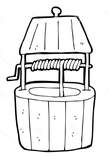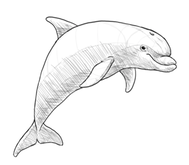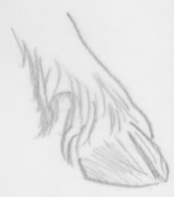 We English speakers have a number of words that mean to raise one’s voice. Yell comes from the Proto-Germanic word gel-, to yell or shout. Some of the older forms live on in a name for a bird that yells out, the nightingale. Our word bellow has been with us since English became itself, too. It seems to have come from the Proto-Indo-European root bhel-, to sound or roar. Back when Old English was in vogue, bellow only referred to the sounds of animals, but by 1600 we humans could bellow with the best of them. Shout entered English about 1300 from an unknown source, though some etymologists argue that it may have come from the originally Old English word shoot, as a shout is a voice thrown or shot out. Others argue it may have come from the Old Norse word skuta, to chide or scold. The Old English word rarian, meaning roar, bellow, lament or cry, became our modern word roar. Though nobody knows for sure, roar is most likely imitative. The word scream is of somewhat unknown origin, though variations of it are peppered through the Anglo Saxon and Germanic languages. Scream showed up in English in the 1100s & originally meant to terrify or scare. As I have a fascination with our ongoing prejudice against Anglo Saxon & Germanic words in favor of the more “civilized” words of Latin & Greek origin, I find it humorous that the English synonyms for yell originating in Latin & Greek are vociferate, & exclaim. To my ear, an exclamation or vociferation simply doesn’t have the guts & oomph found in a good old fashioned yell, shout, roar, bellow, or scream. Please share any thoughts on all this in the comments section. Big thanks to this week’s sources: Wordnik, Etymonline, Merriam Webster, & the OED.
0 Comments
 The Latin word ligare meant to bind. Ligare gave birth to many modern words. Ligament initially meant a bandage or tie. It came straight from Latin. Oblige came to English about 1300, meaning to bind by oath. It came from ligare through French. Delegate also came through French, starting in Latin as delagare to send as a representative, formed by adding the prefix de- (meaning from) to legare. It arrived in English in the 1500s, meaning representative. League appeared in English in the 1100s, meaning confederacy. It came from the Middle French word ligue, which came from the Italian word lega, which came from the Latin word ligare. Ligare also made its way through French to give us the word liaison which arrived in English in the 1640s. When the prefix ad- (meaning to) attached itself to ligare, the Latin word was alligare, which in Old French became aloiier, which arrived in English about 1400 as the word alloy. Rely also came through French, though from a form of ligare that included the prefix re-, not meaning to do again, as re-sometimes means, but meaning very or a lot. The Latin word religare meant to bind fast. In time Old French adopted a form which became the word relier, meaning to assemble, fasten, or attach. When rely made its way to English in the 1300s, its original meaning was to gather or assemble. It wasn’t until the 1570s that rely picked up the additional meaning depend or trust. All these from the Latin word meaning to bind. If any of them surprised you, please leave a note in the comments section. Big thanks to this week’s sources: Wordnik, Etymonline, Merriam Webster, & the OED.  A few years ago at Highlights Foundation, I met my writing guru -- the miraculous Patti Gauch. I can’t say enough about her dedication, gentleness, fierceness, knowledge, and vision. One of her many bits of advice for the writers involves filling the well. The apparently unrelated quotes in this post, all connect to that magical well, & all come from insightful women of note. I hope they will make their way into your wells, bubble around, blend with what’s already there, mingle, fraternize, ferment, and grow. “What a richly colored strong warm coat is woven when love is the warp & work is the woof.” -Marge Piercy “Every bit of new truth discovered is revolutionary to what was believed before.” -Margaret Lee Runbeck “I think you should learn, of course, and some days you must learn a great deal. But you should also have days when you allow what is already in you to swell up inside of you until it touches everything. And you can feel it inside of you. If you never take time out to let that happen, then you just accumulate facts, and they begin to rattle around inside of you.” -E.L. Konigsburg “The greatest sign of success for a teacher…is to be able to say, “The children are now working as if I did not exist.” -Maria Montessori “If I had influence with the good fairy who is supposed to preside over the christening of all children I should ask that her gift to each child in the world be a sense of wonder so indestructible that it would last throughout life, as an unfailing antidote against the boredom & disenchantment of later years, the sterile preoccupation with things that are artificial, the alienation from the sources of our strength.” -Rachel Carson Readers, I hope you’ll leave a note in the comments section regarding any of these that you’d like to pour into your well. Big thanks to the folks at the Highlights Foundation, the unparalleled Patti Gauch, my fellow attendees, & this week’s source: Rosalie Maggio’s The New Beacon Book of Quotations by Women.  What do Sanskrit, Hindi, Lithuanian, Yiddish, Dutch, Spanish, French, Latin, English & Norse have in common? Hard-working etymologists working in the basements of ivory towers have determined these & dozens more all came from one parent language. And since it never got written down & no modern person speaks that parent language, those diligent etymologists have recreated the parent language based on the qualities of the progeny and have called that parent Proto-Indo-European. One of the many proposed bits of Proto-Indo-European is the word pau, meaning few or little, & for an imagined word in an imagined language, our friend pau was a fertile parent. This week’s post takes a look at some of pau’s offspring, which interestingly tend to refer to horses or poverty. The word few, meaning not many, a small number, or a little, arrived in Old English early enough that it appears to have come straight from Proto-Indo-European. It arrived so early we don’t even know its birth year. Foal, meaning foal or colt. came to Old English equally early through Proto-Germanic from Proto-Indo-European. Poor showed up in the 1200s, meaning lacking money or resources, indigent, small or scanty. Its path took it from Proto-Indo-European through Latin & French to English. In the 1400s filly showed up, meaning young mare, female colt or foal. It arrived in English from Proto-Indo-European via Old Norse. In the late 1400s the word paucity came to English, meaning smallness of number or quantity. In turn, paucity gave birth to the musical term poco, meaning a little or slightly. These words made their way from Proto-Indo-European through Latin & French before arriving in English. The word pauper arrived in English in the 1510s, meaning destitute of property or means of livelihood. It also came to English through Latin & French. Pony came to English in the 1650s through Latin, French & Scottish, and refers to a little foal. All these words from pau. I’m hoping some of you will leave brilliant theories in the comments section as to what the deal is with horses & poverty. Big thanks to this week’s sources: Wordnik, Etymonline, Merriam Webster, & the OED.  As noted three posts ago, recent DNA findings have placed some very unlikely animals under the ungulate (hoofed mammals) umbrella: whales, dolphins & porpoises. Most closely related to the hippopotamus, whales, dolphins & porpoises (also known as cetaceans) no longer have an order of their own. Scientists haven’t quite settled over whether cetaceans are a suborder or infra-order of ungulates. The word cetacean entered English in 1830 from Modern Latin, meaning any large sea creature. The Latin term was derived from the Greek word ketos, whale or sea monster. No one knows the source of ketos. The Old English word hwæl, which meant both whale & walrus, gave us the word whale. Our modern idiom whale of a/n _______, meaning big or excellent showed up in 1900. One of many whales is the killer whale. The word killer showed up in the 1400s from the English word kill (which first appeared in the 1200s), & meant one who strikes, beats or knocks. Though we’re not 100% sure, kill may have come from the Old English word cwellan, to kill. Cwellan is also the most likely suspect for the source of qualm & quell. Our idiom to kill time kicked in about 1728. The figurative meaning of killer, impressive person or thing appeared in 1900, and the term killer instinct showed up in the world of boxing in 1931. And getting back to cetaceans, the killer whale was first called that in 1725. In the early 1300s the word porpas appeared in English, from the Old French word porpais, which translates ingloriously to pork fish. Interestingly, the German word for porpoise translates literally to sea hog. It’s likely the somewhat pig-like snout of the porpoise may be responsible for both words, though a modern etymologist might wonder whether those long-ago French & German porpoise-namers may have sensed a deeper connection to the porpoise’s distant ungulate cousin, the pig. Our word dolphin came from French in the mid-1300s. We can trace dolphin back through Old French, Medieval Latin, Latin & Greek to the word delphinos, meaning dolphin. This Greek root is closely related to delphys, meaning womb. Etymologists suggest Ancient Greeks found it remarkable that instead of coming from eggs, the progeny of this “fish” arrive through live birth. Dear readers. If you’ve got anything to say about these water-bound “hoofed mammals,” please do so in the comments section. Big thanks to this week’s sources: Wordnik, Science Direct, Ultimate Ungulate,Etymonline, & the OED.  For the past two posts we’ve considered the etymologies of well-known ungulates like pigs and deer. Today, we’ll wrap up with some of the lesser-known ungulates of the world. In 1774 English speakers first wrote the word tapir to refer to a 330-700 pound South American mammal with a prehensile snout. The English word tapir came from the Tupi language of Brazil, probably through French. The springbok is a gazelle of South Africa. Springbok came to English from Afrikaans in 1775. Springbok is a compound word using springen, to leap & bok, antelope. The dik-dik is a tiny (7-16 pound) African antelope. The word came to English in 1880 from one of the many east African languages; sadly, nobody knows which one. It’s likely that the name is onomatopoeic, as the “bark” of the dik-dik sounds much like its name. Another African antelope, the kudu, got its name from the Xosa-Kaffir language (originally iqudu). Kudu made its way into English in 1777. In the year 1900 the Mbuba language of the Congo gave English the word okapi, a short-necked giraffe of the region. Another African antelope, the impala, got its name from another native African language, Zulu. The word impala showed up in English in 1875. Impala didn’t make its way in chrome onto the side of a Chevrolet until 1958. The ibex is a goat native to parts of Africa and Eurasia. The word ibex first appeared in English in the early 1600s, coming through Latin from an unidentified source. The Tibetan word q-yag gave us yak, the wild ox of Central Asia. Yak came to English in 1795. Here’s hoping a little attention has raised the spirits of the world’s underappreciated ungulates. Big thanks to this week’s sources: Wordnik, Ultimate Ungulate, Etymonline, & the OED.  Last week we took an initial look at ungulates. This week we’ll start with the observation that the idiom hog heaven came into use about 1940, then we’ll look into a few words that define the more hog-related ungulates. The word swine, meaning pig, hog or wild boar, applies too all the hog-like critters below. Swine showed up in English before English was English, and come from the Proto-Germanic word swinan. The word sow, referring to the female pig is closely related to the word swine & has been around as long. The word hog has been a part of the English language since the 1100s. Interestingly, hog originally referred to the age of a critter, and was applied to what we now call hogs, horses and sheep when they were about a year old. It wasn’t until 1400 or so that sheep and horses left the word hog behind. Within the next century hog also began to mean a gluttonous person. A gathering of hogs has been known as a drift, a piggery & a hoggery. The origin of the word pig is a bit of a mystery. It was in use in Old English (spelled pigc), & referred only to young pigs, while the mature ones were called swine. Words for gatherings of pigs include litter, farrow, drove, cote, sounder & team. The javelina (also known as a peccary), is a native of Mexico and the southwest United States. The word javelina came to English in 1815 through Spanish from Arabic, where the word jabal i meant mountain swine. The word peccary, on the other hand, entered in English in 1610 from one of the Carib languages (most likely Venezuelan or Guianan). A gathering of javelinas or peccaries is known as a sounder. What have you to say about all this ungulation? Big thanks to this week’s sources: David W. K. Godrich’s A Gaggle of Geese, Wordnik, Ultimate Ungulate, Etymonline, & the OED.  This week, let's appreciate a typically underappreciated order of critters, the ungulates. The word ungulate first showed up in English in 1802 from the Latin word ungulatus, or hoofed. Soon after that, in 1839 the word ungulates began representing the entire order of hoofed mammals. Recent advances in DNA testing have completely changed our understanding of which critters are & aren’t ungulates. The old-school ungulates have now been sliced, diced & moved around. Who knew in 1839 that a hippopotamus was more closely related to a whale than it was to a rhinoceros? Who ever guessed that whales belonged in the order named for hooved mammals? There are 257 species of ungulates on the globe as I type. In the next three posts we’ll take a look at the etymologies of a few of them. In the 1300s, the word rhinoceros appeared in English, taken from the Greek word rhinokeros, which meant nose-horned. The word hippopotamus showed up in the 1560s. It came through Late Latin, but started with the Greeks, & meant river-horse. This spelling replaced the earlier Middle English word ypotame, which also means river-horse & also comes from Greek, but made its way through French before landing in England. The word deer is an Old English word once spelled doer. It meant animal or beast. Heorot, the word the Old English used to refer to the modern critter we call a deer morphed in time to the word hart. It seems that the word deer won out over time because enough folks going hunting for any animals preferred finding deer to the other options (some which had nasty tusks). In time, the initially general term took on the more specific meaning. An Algonquin language (most likely Narragansett or Abenaki) gave English the word moose in 1610 The word means he strips off, which refers to either the moose’s habit of using his palmate antlers to strip the bark off trees, or to the moose's use of the bark of trees to strip the "velvet" from the antlers. Junior etymologists unite! What have you to say about all this ungulation? Big thanks to this week’s sources: Merriam Webster, Wordnik, Ultimate Ungulate,Etymonline, & the OED.  Thanks for tuning into the third of three posts on up, a brief list of a few more idioms that employ the word up. 1700s – to cheer up or become happier 1700s – bottoms up or cheers! 1809 – toss-up or an even matter 1818 – to turn up one’s nose or show disdain 1823 – to upend or turn over 1844 – to buck up or cheer up 1860 – to jack up or hoist or raise 1881 – to whoop it up or make a joyful disturbance 1896 – all choked up or overcome with emotion 1903 – to live it up or live extravagantly 1904 – to jack up or raise a price 1926 - to wrap up or put an end to 1933 – to mess up or make a mess of 1935 – to shack up or cohabit 1960 – upchuck or vomit Please use the comments section to remark on any of these terms or the dates they appeared. Big thanks to this week’s sources: Go English, Albert Jack, Etymonline, & the OED.  The word up was spelled in a number of ways in Old English, including up & uppe. It meant up or upward & came from the Proto-Indo-European word upo, which also gave us the Greek word hypo (as in hypo-allergenic, hypochondriac & hypodermic). In last week’s post I mentioned that up performs as an adverb, noun, verb & adjective. I missed something. Up also functions as a preposition. Adverb – Marcel walks up the hill. Adjective - Ophelia seems up today. Verb - The grocer upped the price of blueberries. Noun - The market has its ups & downs. Preposition - Madeleine’s speedy departure left Stanley up in the air. And here are a few more uppish idioms: 1847 – The term getup (or get-up) refers to one’s costume. This appears to have come from the 1841 idiom getup meaninginitiative or energy. 1853 – upholster is referred to by linguists as a “back formation” because it appears to be a base word, but actually came from the longer word (from 1610) upholsterer, which refers to a person who fixes furniture. Upholsterer comes from the word upholdester, which came from the word upholden back in the 1300s, and meant repair, uphold, keep from falling or sinking. 1891 – To send someone up the river, meaning to send someone to jail, originated in New York City, as the prison Sing Sing was up the Hudson River from the city. 1922 - coverup (or cover-up) means the act of concealing. It appeared in print as two words (cover up) as early as 1872. 1947 – upbeat, meaning with a positive mood, comes from the 1869 musical term upbeat, which labels the beat during a bar when the conductor’s baton is pointed upward. 1951 - To drive someone up the wall, meaning to annoy or irritate, came from the observed behavior of some animals (& patients) in cages. Please use the comments section to tell me what’s up. Big thanks to this week’s sources: Merriam Webster, Wordnik, Etymonline, & the OED. |
I write for teens & tweens, bake bread, play music, and ponder the wonder of words in a foggy little town on California's central coast.
To receive weekly reminders of new Wordmonger posts, click on "Contact" & send me your email address. Archives
November 2023
|


 RSS Feed
RSS Feed